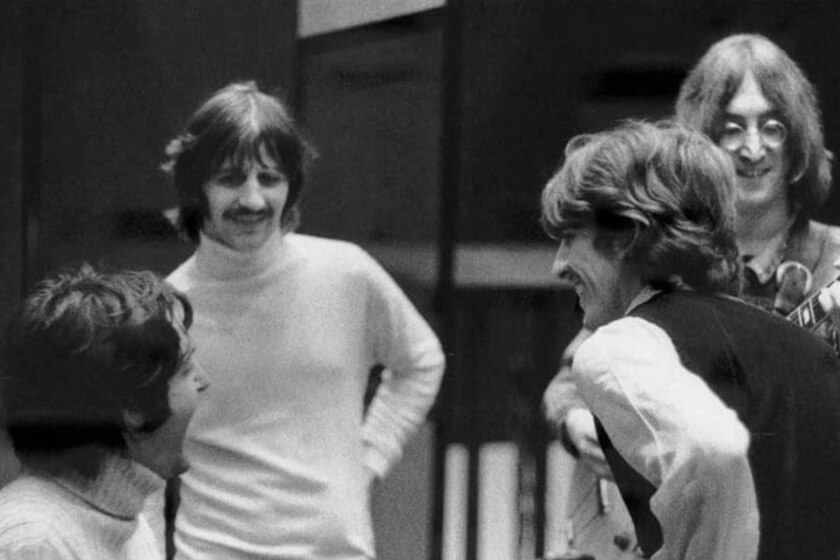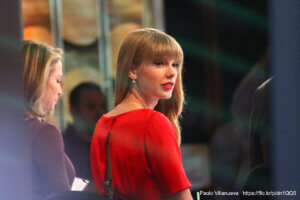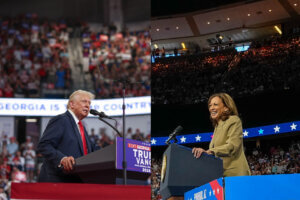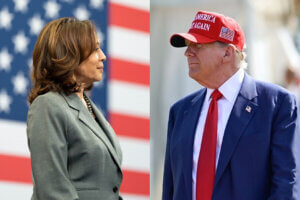West Long Branch, NJ – Nearly five decades after they broke up, the Beatles are the clear leader when Americans name the greatest rock and roll band of all time. The Monmouth University Poll finds that fully 86% of U.S. adults like the Beatles while only 8% dislike them. While the Beatles continue to have widespread appeal, the poll also finds that their standing has been touched by the current political atmosphere, with a dip in their popularity among Republicans over the past decade.
When asked to name the greatest rock and roll band or group of all time, nearly 1-in-4 (23%) U.S. adults say “The Beatles.” Trailing far behind are the Rolling Stones (8%), Led Zeppelin (4%), AC/DC (4%), the Eagles (3%), Aerosmith (2%), Queen (2%), and dozens of other groups mentioned by no more than 1% of poll respondents. These results have not changed much from a Gallup Poll taken nearly 20 years ago which found the Beatles named as the all-time greatest band by 29% of the public and the Stones in second place with 9%.
“The Beatles enjoy remarkable longevity among music lovers of all stripes because of their time-eclipsing compositions and exquisite musicianship,” said Ken Womack, Ph.D., dean of the School of Humanities and Social Sciences at Monmouth University. Womack is a noted Beatles scholar who recently authored a two-volume biography of famed producer George Martin. He is also organizing Monmouth University’s international symposium on the “White Album” from Nov. 8 to 11 (www.monmouth.edu/the-white-album). This gathering of Beatles contemporaries, scholars and fans is being presented in association with the university’s Bruce Springsteen Archives and Center for American Music to recognize the 50th anniversary of this seminal recording’s release.
The poll finds the Beatles are the top band among every demographic group, including men (20%) and women (25%); those age 18 to 44 (17%), age 45 to 64 (24%) and age 65 or older (30%); white non-Hispanic Americans (24%) and Americans of black, Hispanic, Asian and other racial backgrounds (21%); and Democrats (24%), Republicans (16%), and independents (27%).
Nearly 9-in-10 Americans say they like the Beatles, including fully half (50%) who say they like the Fab Four a lot and 36% who like them a little. Only 8% of the public dislikes the Beatles. These results are nearly identical to a Pew Research Center poll taken almost a decade ago which found 49% of the public liked the Beatles a lot, 33% liked them a little, and 11% disliked them.
There have been some demographic shifts in who likes the Beatles “a lot.” Currently, 50% of those age 65 or older like the group a lot, which is up 7 points from 43% in 2009. On the other hand, 56% of those age 45 to 64 currently like them a lot, which is down 7 points from 63%. Those age 18 to 44 who like the Beatles a lot is virtually unchanged over the same time period – 43% now and 42% in 2009. These shifts seem natural as Americans who were teenagers and young adults in the 1960s now move into the older age category.
Another less obvious shift in the Beatles’ fan base is by political affiliation. Opinion of the group has ticked up slightly among Democrats – 54% like the Beatles a lot in 2018 compared with 51% in 2009 – and independents – 53% like them a lot in 2018 compared with 49% in 2009. However, highly positive views among Republicans have dropped by 10 points over the same period – 40% like the Beatles a lot now compared with 50% in 2009.
The Beatles are not the only act who has experienced a shift in partisan support. The Pew Research Center found that 41% of Americans liked Kanye West either a little or a lot back in 2009. A recent CNN/SSRS poll (May 2018) found that 23% of Americans have a favorable opinion of the rapper now. While the actual questions asked in the two polls are not directly comparable, the differences in how partisan opinion has shifted are worth noting. In 2009, 32% of Republicans liked Kanye. In 2018, a similar number – 35% – have a favorable opinion of him. In 2009, fully half (50%) of Democrats said they liked Kanye. This year, just 12% of Democrats have a positive view of the man who claims to have the same “dragon energy” as President Donald Trump.
“Even popular music cannot escape being touched by the growing political tribalism of our times. Obviously, Kanye has directly inserted himself into this highly charged atmosphere. But even the Beatles’ legacy, which still maintains widespread appeal, has been tinged by this partisanship” said Patrick Murray, director of the independent Monmouth University Polling Institute. Murray will be presenting these findings and other polling results about the Beatles at this week’s “White Album” symposium.
The majority of Americans (58%) say that the Beatles appeal equally to people across the political spectrum today, but 1-in-4 (24%) say they appeal more to liberals and just 3% say they appeal more to conservatives. Majorities of Democrats (61%), independents (60%), and Republicans (52%) agree that the Beatles’ appeal spans the political spectrum, but Republicans (31%) are somewhat more likely than Democrats (23%) and independents (22%) to say their appeal is geared more toward the left.
Looking back to the Beatles’ place in the turbulent history of their own times, 40% of the public see the group as being about as political as other bands from the 1960s, 30% say they were more political, and 14% say they were less political. Democrats (38%) and independents (32%) are more likely than Republicans (20%) to see the Beatles as being more political than other bands from the same era.
“The Beatles’ message of peace and hope continues to resonate into the present day. Songs like ‘All You Need Is Love’ and ‘Blackbird’ speak indelibly to our innately human need to establish community and persevere,” said Womack, the Monmouth dean and Beatles expert.
The Monmouth University Poll was conducted by telephone from August 15 to 19, 2018 with 805 adults in the United States. The question results in this release have a margin of error of +/- 3.5 percentage points. The poll was conducted by the Monmouth University Polling Institute in West Long Branch, NJ.
QUESTIONS AND RESULTS
(* Some columns may not add to 100% due to rounding.)
B1. What do you think is the greatest Rock and Roll band or group of all time? [LIST WAS NOT READ.]
| TREND: | Aug 2018 | March 1999* |
| The Beatles | 23% | 29% |
| The Rolling Stones | 8% | 9% |
| AC/DC | 4% | 1% |
| Led Zeppelin | 4% | 3% |
| The Eagles | 3% | 3% |
| Aerosmith | 2% | 2% |
| Queen | 2% |
<1% |
| The Beach Boys | 1% | 2% |
| Bon Jovi | 1% |
n/a |
| Bruce Springsteen & the E Street Band | 1% |
<1% |
| Creedence Clearwater Revival | 1% | 1% |
| Def Leppard | 1% |
n/a |
| Elvis Presley | 1% | 1% |
| Fleetwood Mac | 1% | 1% |
| The Grateful Dead | 1% | 1% |
| Guns N’ Roses | 1% |
n/a |
| The Jimi Hendrix Experience | 1% |
n/a |
| Journey | 1% |
n/a |
| Kiss | 1% |
<1% |
| Lynard Skynard | 1% | 1% |
| Metallica | 1% | 1% |
| Pink Floyd | 1% | 1% |
| U2 | 1% | 1% |
| The Who | 1% | 1% |
| Other | 19% | 17% |
| None | 7% | 4% |
| (VOL) Don’t know | 14% | 23% |
| (n) | (805) | (1,021) |
* Source: Gallup Poll
B2. Do you like or dislike the Beatles, or haven’t you heard of them? [If LIKE: Do you like them a lot, or a little?]
| TREND: | Aug 2018 | July 2009* |
| Like, a lot | 50% | 49% |
| Like, a little | 36% | 33% |
| Dislike | 8% | 11% |
| Not heard of | 2% | 4% |
| (VOL) Don’t know | 4% | 3% |
| (n) | (805) | (1,701) |
* Source: Pew Research Center (results for age 18 and older only)
B3. Do you think the Beatles today appeal more to people with liberal political beliefs, more to people with conservative political beliefs, or do they appeal equally to people across the political spectrum?
| Aug 2018 | |
| Appeal more to liberals | 24% |
| Appeal more to conservatives | 3% |
| Appeal equally across political spectrum | 58% |
| (VOL) Don’t know | 15% |
| (n) | (805) |
B4. Do you think the Beatles were more political, less political, or about as political as other bands from the 1960s?
| Aug 2018 | |
| More political | 30% |
| Less political | 14% |
| About as political | 40% |
| (VOL) Don’t know | 16% |
| (n) | (805) |
METHODOLOGY
The Monmouth University Poll was sponsored and conducted by the Monmouth University Polling Institute from August 15 to 19, 2018 with a national random sample of 805 adults age 18 and older, in English. This includes 400 contacted by a live interviewer on a landline telephone and 405 contacted by a live interviewer on a cell phone. Telephone numbers were selected through random digit dialing and landline respondents were selected with a modified Troldahl-Carter youngest adult household screen. Monmouth is responsible for all aspects of the survey design, data weighting and analysis. Final sample is weighted for region, age, education, gender and race based on US Census information. Data collection support provided by Braun Research (field) and SSI (RDD sample). For results based on this sample, one can say with 95% confidence that the error attributable to sampling has a maximum margin of plus or minus 3.5 percentage points (unadjusted for sample design). Sampling error can be larger for sub-groups (see table below). In addition to sampling error, one should bear in mind that question wording and practical difficulties in conducting surveys can introduce error or bias into the findings of opinion polls.
| DEMOGRAPHICS (weighted) |
|
Self-Reported |
| 29% Republican |
| 39% Independent |
| 32% Democrat |
| 48% Male |
| 52% Female |
| 41% 18-44 |
| 34% 45-64 |
| 25% 65+ |
| 65% White |
| 12% Black |
| 15% Hispanic |
|
8% Asian/Other |
| 69% No degree |
| 31% 4 year degree |
Click on pdf file link below for full methodology and results by key demographic groups.




